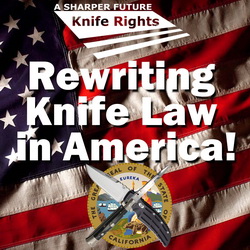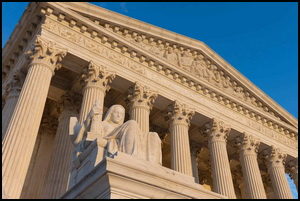
The recent pro-Second Amendment decision by a panel of the Eighth Circuit in Worth v. Jacobson bears on our lawsuit challenging California’s ban on switchblade (automatic) knives with a blade 2-inches and greater on Second Amendment grounds. Plaintiffs have filed a second Notice of Supplemental Authority with the District Court hearing the case.
As with our first Notice of Supplemental Authority, this one deals with the key issue raised by the State, and which was a focus of the Court during the hearing, the baseless argument that in interpreting the plain text of the Second Amendment’s “the right to keep and bear arms,” the term “arms” somehow is limited to only arms “commonly used for self-defense” as opposed to all bearable arms.
In the Notice, Plaintiffs’ attorney, John Dillon, notes, among four points, that, “the Eighth Circuit reiterated that, ‘[W]hen the Second Amendment’s plain text covers an individual’s conduct, the Constitution presumptively protects that conduct. To justify its regulation, the government may not simply posit that the regulation promotes an important interest. Rather, the government must demonstrate that the regulation is consistent with this Nation’s historical tradition of firearm regulation. Only if a firearm regulation is consistent with this Nation’s historical tradition may a court conclude that the individual’s conduct falls outside the Second Amendment’s “unqualified command.'”
The Notice concludes that, “Each of the above points in Worth address issues squarely presented in the pending cross-motions for summary judgment, including, among other issues: (i) how Bruen’s textual analysis is centered on the plain text of the Second Amendment…” As we have noted previously, simply put, neither the State nor the Court, can read additional conditions and qualifications into the Second Amendment’s plain text that are not there.
Stay tuned for the next installment of Knife Rights Unconstitutional Switchblade Bans Chronicles.
Please support Knife Rights’ lawsuits with a tax-deductible donation to the Knife Rights Foundation at: www.KnifeRights.org/donate (select Knife Rights Foundation)
BACKGROUND
 Broadly, in NYSRPA v. Bruen the Supreme Court held that the Second Amendment includes the right to be armed for self-defense at home and in public. This right can only be limited to the extent that there is a historical tradition of limitation in the period immediately prior to and around the time of the Constitution’s framing in the late 18th century up to the late 19th century. A few restrictions on knives of various sorts that are outliers from that time period do not count. Restrictions imposed later, including on switchblades in the 1950s, don’t count. Possession and carry of knives survives this constitutional test.
Broadly, in NYSRPA v. Bruen the Supreme Court held that the Second Amendment includes the right to be armed for self-defense at home and in public. This right can only be limited to the extent that there is a historical tradition of limitation in the period immediately prior to and around the time of the Constitution’s framing in the late 18th century up to the late 19th century. A few restrictions on knives of various sorts that are outliers from that time period do not count. Restrictions imposed later, including on switchblades in the 1950s, don’t count. Possession and carry of knives survives this constitutional test.
Bruen upheld restrictions on weapons such as machine guns that are deemed by the court to be both “dangerous and unusual.” A weapon that is either not “dangerous” or not “unusual” cannot be prohibited. Automatically opening (“switchblade”) knives and other knife designs and opening mechanisms are neither “unusual,” being legal and common in most places today, nor any more “dangerous” than other non-prohibited knives or weapons. Knife bans existent today do not pass constitutional muster after Bruen.
Bruen also emphasized emphatically from the court’s prior Second Amendment McDonald decision that “the constitutional right to bear arms in public for self-defense is not a second-class right, subject to an entirely different body of rules than the other Bill of Rights guarantees.” Second Amendment decisions by courts must be made on the basis of strict scrutiny, just as with other rights. Intermediate scrutiny or “interest balancing” can no longer be used to decide Second Amendment cases. As such, the government can no longer defend knife bans because government doesn’t like a particular type of knife, for whatever irrational basis it comes up with.
Knife Rights (www.KnifeRights.org) is America’s grassroots knife owners’ organization; leading the fight to Rewrite Knife Law in America™ and forging a Sharper Future for all Americans™. Knife Rights efforts have resulted in 44 bills enacted repealing knife bans in 27 states and over 175 cities and towns since 2010.


